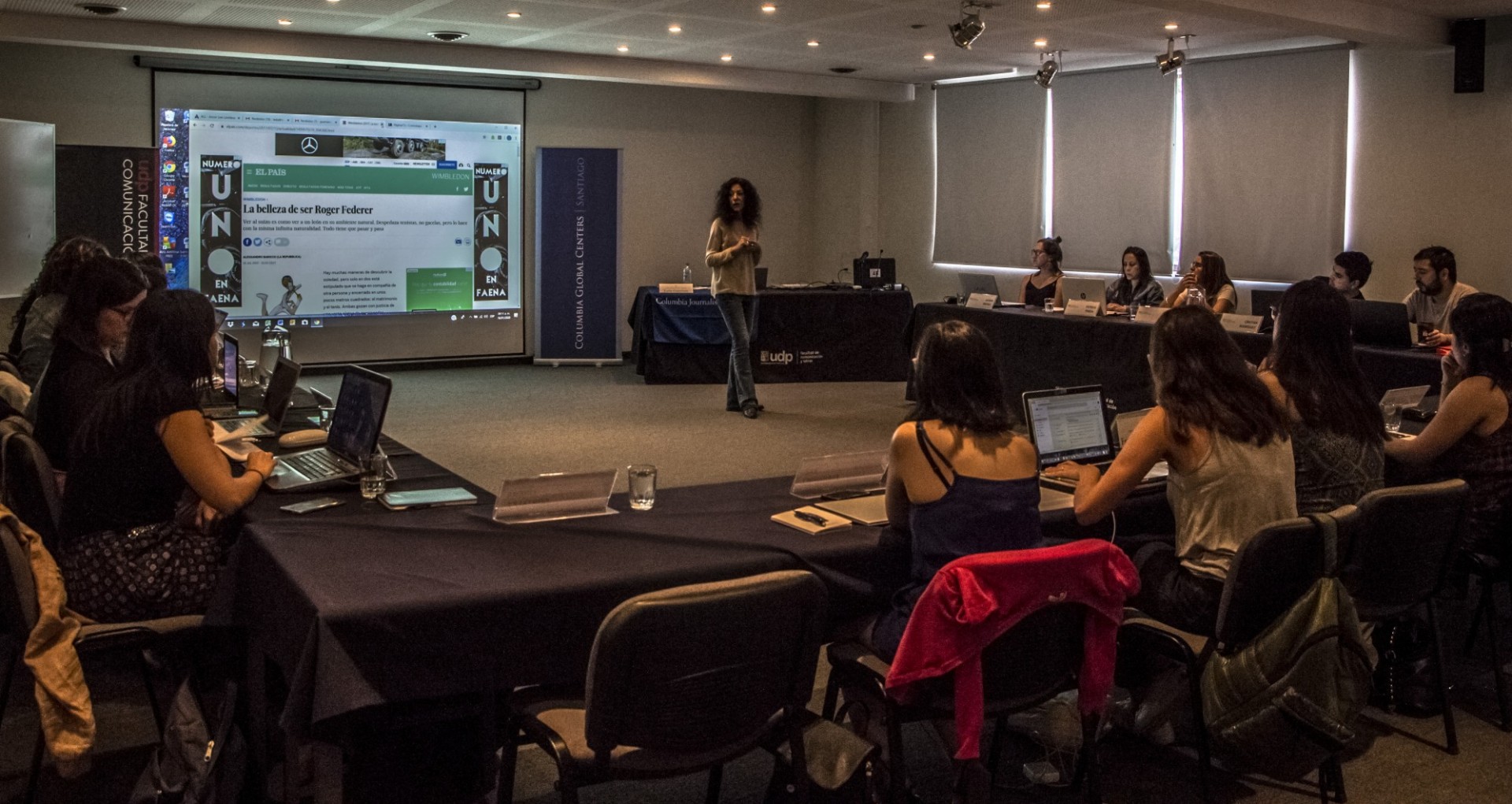Columbia Journalism School Offers First-Ever Investigative Course in Chile
The Columbia Journalism School, in conjunction with Universidad Diego Portales (UDP) and the Santiago Center, held its first ever investigative journalism course in Chile during the first two weeks of January.
The course has traditionally been offered in Cartagena, Colombia, in conjunction with Fundación Gabo. But “the Santiago Center Director, Karen Poniachik and I had been talking for a couple of years about offering this course for Chilean journalists. I wanted to wait until we had done this course at least a couple of times in Cartagena – with journalists from different countries to have a better exchange of cultures, styles, journalistic traditions and the way they approached journalism - and gotten a good feel of how to do it,” says Ernest Sotomayor, Director of Latin America Initiatives at the Columbia University Graduate School of Journalism.
“About a year ago we felt ready to do this, so we planned this program with the full support of the Santiago Center and the dean of the journalism school, Steve Coll. We decided to coordinate and collaborate with UDP in this venture, which offered tremendous support and great facilities, with several of their own professors, and it was very successful all around.”
A total of 20 journalists from different written, digital, radio and television media participated in the workshop, whose objective was to provide tools for the realization of investigative projects, the creation of a cross-border collaboration network and learning how to review and use different databases. Part of the application process involved presenting a case to investigate, and 16 Chileans, three Venezuelans and one Cuban reporters were chosen.
“All participants were enthusiastic, they worked hard, they asked lots of questions, they were very animated and from everything we saw, I think they are very committed to doing this type of journalism, using the techniques we were teaching them… that will allow them to be better journalists,” he adds. “The instructors were also very enthusiastic about sharing; they wanted to pass along useful information. The main thing we wanted the students to understand is that investigative journalism involves a process and structure - you need to be organized and disciplined in the way you work, in order to be exact in the way you write your story.”
Topics covered included:
- The basic aspects of the conception of an investigative project.
- The construction of a working hypothesis.
- The techniques to structure the process for conducting an investigation, how to administer and execute the project, through its final phase and public disclosure.
- How to obtain, analyze and visualize data and how to tell stories on multiple platforms.
- How to search public records around the world, how to understand and use financial documents, interview techniques, and how to structure an investigative story.
- How to investigate cross-border corruption in collaboration with journalists from other companies.
In particular, during the first week, UDP Journalism School Director, Francisca Skoknic (SIPA ’13), explained the concepts of investigative journalism and how to develop solid projects. In addition, CNN Chile anchor and Santiago Center Board Member, Daniel Matamala (JN ’12), presented on conducting interviews. To conclude the first part, Hugo Alconada Mon, editor investigations of Argentine newspaper La Nación, delved into the methods for investigating public and financial organizations.
In the second week Giannina Segnini, Columbia’s Director of the Master of Science Data Journalism Program, introduced the fundamentals in using data for journalistic investigations, while Leila Guerriero, Latin America editor of Gatopardo Magazine presented on storytelling. Finally, UDP Journalism School professor Pedro Ramírez reviewed how to use Chile’s transparency law in reporting and CIPER Chile editor Alberto Arellano taught how to employ Chilean databases in investigation. Both reviewed the progress of the participants' proposals.
“No one else in the world is really offering this type of instruction in investigative journalism, certainly no one in Latin America has done it,” notes Sotomayor. “The participants realized that it was something very special to be part of this, appreciating that this was the first time in Santiago. It really demonstrates the tremendous need to do this type of training in the country.”
Looking forward, Sotomayor says the team will now continue with plans for the annual program in Cartagena in June, spreading the word and arranging the faculty in conjunction with the Latin American Center for Investigative Journalism, CLIP. “After that, we’ll be talking with Karen [Poniachik] and the Global Centers regarding the program next year in Chile. It was a very positive experience and I think all would be very happy to repeat it.”
Use this link to see the photo album.
